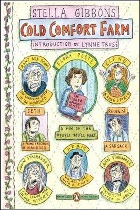 Stella Gibbons •
Stella Gibbons •
Cold Comfort Farm •
Small wonder Cold Comfort Farm has been dramatized umpteen times: It’s one of the funniest books ever written.
Flora Poste, a young London socialite, has recently lost her parents. She plans to write a best-selling novel, but in the meantime needs relatives who will support her, and settles on the Starkadder family at Howling. “It does sound interesting and appalling,” admits her bosom friend Mrs. Smiling, a connoisseur of brassieres. “The others just sound appalling.”
There have always been Starkadders at Cold Comfort, and for decades they’ve been ruled by the iron hand of Aunt Ada Doom, who once saw “something nasty in the woodshed” and invokes it every time a family member threatens to leave. Well might they want to escape: Cold Comfort more than lives down to its name. The place is desolate, impoverished, and filthy—appalling indeed.
But Flora, a born reformer, takes the gloomy situation in stride. Before long she has charmed her cousins, the oversexed Seth and the fiercely territorial Reuben; worked miracles with the preacher of the Quivering Brethren; and introduced birth control among the hired help. Her tactics for deposing Aunt Ada are nothing short of inspired.
Now if she could just get her own affairs in order.
The book is larded with so many wonderful expressions—scranlet, a-mollocking, sukebind—that it’s difficult to tell where Sussex-isms leave off and Gibbons’s coinages begin. The proper names are no less inventive—Urk, the Hawk-Monitors, Ticklepenny’s Corner, Mr. Mybug.
Drawings by New Yorker artist Roz Chast enliven the cover of the Penguin edition, and Lynne Truss (Eats, Shoots & Leaves) contributed the introduction. But Cold Comfort Farm is a treasure with or without these adornments.






So what exactly is a scranlet?
As near as I can speculate, it’s the part of a seed-plough that pushes forward through the topsoil to produce a furrow. It would be the bit that looks like a bifurcated shovel; as it is forced through the earth, the soil that it displaces is shoved outward to the left and to the right, leaving linear raised mounds on either side of the resultant trench. In keeping with the suspected etymology of scranlet, this removed dirt might be referred to as scrannel. (from a Scandinavian origin, through to English and Scots dialect words for rubbish, or waste, or scrap…for example, by [once again[ specualtive extension, cast-off soil.
Wow, I’m impressed! My hat is off to your research skills.
Tantalizing, isn’t it? But you’ll just have to read the book to find out.
On my eighth time of reading Cold Comfort Farm, it just gets better and better.
My all-time favourite film. Brilliantly witty, delightful acting by an amazing all star cast. Especially love all the regional references: “it is Sussex!” my usual stomping grounds for frequent visits to England
If you like the film, you’ll love the book too. Gibbons has a timeless sense of humor.